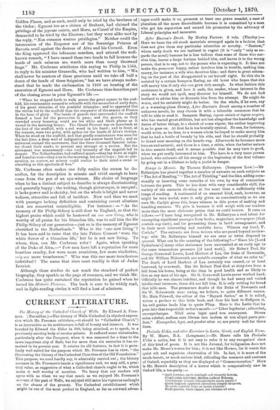Essays in Mosaic. By Thomas Ballantyne. (Sampson' Low.)—Mr Ballantyne has
pieced together a number of extracts on such subjects as. " The Art of Reading," " The Art of Thinking " and the like, adding occa- sionally or inserting some remarks of his own, by way of connection between the parts. This he has done with very considerable skill, the variety of the extracts showing at the same time a sufficiently wide range of reading. A testimonial of an unusual kind, such, however, as- might be very useful, were it only given as conscientiously as we are sure Mr. Carlyle gives this, bears witness to this power of making and handling extracts. We give it because it will weigh with our readers. more than the most elaborate praise that we could bestow. It runs as. follows :--"I have long recognized in Mr. Ballantyne a real talent for excerpting significant passages from books, magazines, newspapers (that. contain any such), and for presenting them in lucid arrangement, and in their most interesting and readable form. Witness my hand, T. Carlyle." The extracts are from writers who are paged beyond review- ing; with Mr. Ballantyne himself we are once or twice disposed to- quarrel. What can be the meaning of the following?—" Since his [Lord Sydenham's] many other statesmen have succumbed at an early age to- the same tremendous pressure [of hard work]. Sir Robert Peel, Sir- George Cornewall Lewis, Lord Herbert of Lea, the Duke of Newcastle, and Sir William Molesworth are notable examples of what we refer tot' The death of Lord Herbert of Lea certainly was caused, or at least- hastened, by overwork. But Sir Robert Peel died at sixty-two from a fall from his horse, being at the time in good health and as likely to- live as any man of his age. Sir G. Cornwall Lewis never worked hard- Officially he was almost indolent, and though he had many and varied intellectual interests, these did not kill him. It is only writing for bread that kills men. The premature deaths of the Duke of Newcastle and Sir W. Molesworth wore owing, we believe, to quite different causes. Mr. Hain Friswell, the editor of the "Bayard Series," as it is called, writes a preface to this little book, and does his beat to disfigure it. An evil genius leads him to quote Pliny. Here is the Latin that he puts into that respectable writer's mouth :—" Libor legebatur ; adnotabat,.
excerptebatque. Nihil enim leget quod non excerperet. Dicers enim solebat, nullum ease librnm tam ma'am nt non aliquil parte pro-- dest." Excerptebat, leget, and prodest after ut, are pretty well for three lines.






























 Previous page
Previous page